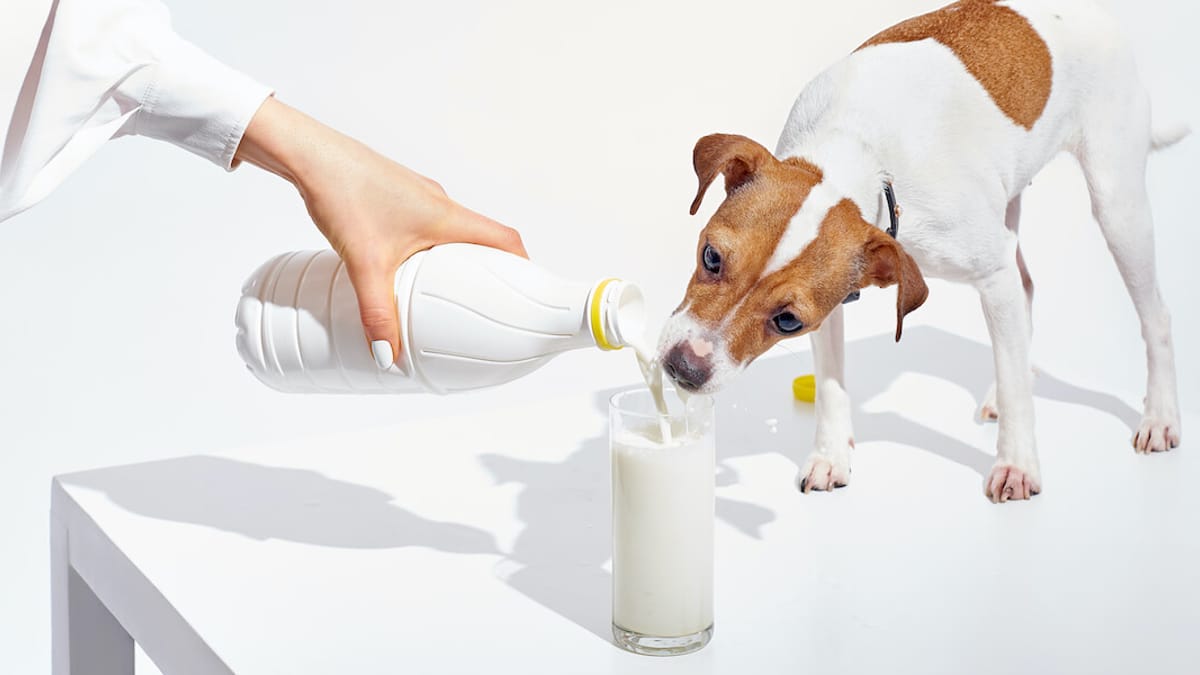Discovering the best selection of milk for dogs.
© Commercial RAF
Posted on
If the puppies cannot be nursed by their mother, it is necessary to resort to milk for dogs suitable for the situation.
It is not recommended to give them cow’s milk because it is too high in lactose and not enough protein. It is best to use a specific formula or, failing this, goat’s milk, which is easily digestible.
Dog milk usually comes in the form of a powder to be rehydrated with warm water. Some brands offer complete nursing kits with milk for puppies, bottles and teats.
Adult dogs don’t need milk and often don’t digest it.
Can you give your dog milk?
Cow’s milk that we humans consume on a regular basis is not recommended for our little dogs:
- In the adult dogs it is often poorly tolerated as it is rich in lactose, which canines do not digest well because they do not have the necessary enzymes. Furthermore, milk, which contains mainly fast sugar (lactose), is not really necessary for the dog’s diet.
- For i puppies it is better to use a specific formula with a composition close to that of bitch’s milk, which is much more suitable. Don’t forget that cows are herbivores; their milk is too low in protein and not really suitable for feeding carnivores!
- For the female dog during the gestation or lactation period, a specific milk can bring benefits. But if the female is reluctant to drink it she can also be given a food for growth.
From what age can dogs be given milk?
Puppies can be fed with specific milk from birth.
Of course, it is preferable for the dog to breastfeed the puppies, but if she is prevented from doing so or if the litter is too large, do not hesitate to use supplements to ensure that they are receiving sufficient nutrition for their development.
For orphans, it may be interesting to provide a product that combines colostrum and dog milk. Colostrum contains antibodies that help the puppy defend against disease.
After weaning, at about 2 months of agethere is little point in giving milk to the dog, except in the case of a nursing bitch.
How much milk to give to the dog?
The amount varies according to the age and weight of the puppy. Generally, dog milk manufacturers indicate the quantities and frequency of feeding on their packaging.
Il number of feedings it varies from 8 per day for a newborn puppy to 4 for a 1 month old puppy.
If your puppy is being fed both breast milk and bottle, it can be more difficult to know how much to feed him. Know that a hungry puppy will continue to cry, while a full one will fall asleep.
Another way to tell if your puppy is eating enough is to look at his weight curve. A well-fed puppy will triple his birth weight within 3 weeks.
From the age of 2 months, you can start diversifying your diet by introducing puppy food. The amount of milk is therefore reduced.
Are there any risks of giving milk to dogs?
The puppy formula, which is similar to breast milk, is well tolerated. While cow’s milk can cause diarrhea, vomiting and bloating. These symptoms are usually mild in adults and lessen when cow’s milk is stopped.
On the other hand, they can be serious in younger specimens, which are more fragile and risk dehydration in case of marked gastroenteritis. You should therefore avoid cow’s milk and always consult your veterinarian in case of diarrhea in a puppy.
Can my dog be allergic to milk?
In dogs, cow’s milk allergies and intolerances can occur. That is why it is not recommended. Dairy products in general (yogurt, cheese, ice cream, etc.) can cause digestive symptoms.
Infant formula for puppies also contains cow’s milk proteins and can exceptionally be responsible for allergic disorders such as chronic diarrhea. In this case, it is possible to try goat or plant milk if breastfeeding is really impossible.
The introduction of a solid non-dairy food from 2 months of age can solve the allergy problems associated with dog milk.

